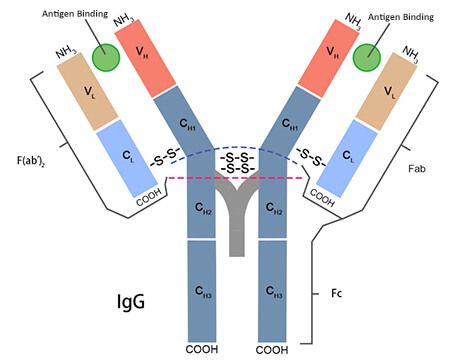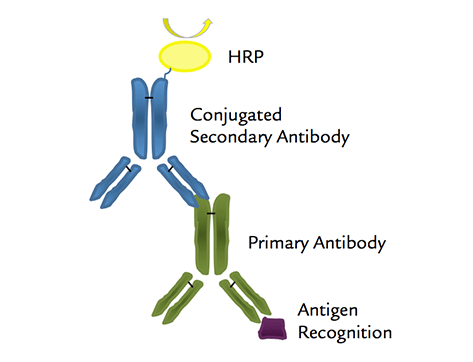1. Primary Antibody Selection
A primary antibody is the immunoglobulin which can specifically bind with the relevant antigen, including polyclonal and monoclonal antibody. There are various antibodies for the detection of any target protein. Four factors for primary antibody selection are listed below.

1.1. Sample Species Type
First, determine the species type of the sample, E.g. human, mouse, rat, dog, rabbit etc. The reactivity of selected antibody should contain the sample species. Due to the higher homology of amino acid sequence, antibody may cross-react with the identical target protein of different species. The sample species type not found in the reactivity of the manual doesn't mean the antibody is unsuitable for detecting the protein of the species. In fact, the species hasn't been validated by this antibody. The cross reaction can be predicted by sequence alignment. The protein homology of different species can be compared by Expasy and NCBI BLAST.
1.2. Antibody Experimental Application
Determine your own experimental application and select the antibody including the application, E.g. ELISA, WB, IHC, IP, FC etc. Usually, the manual will list validated applications. The application not mentioned and validated in the manual can be asked from the vendor.
1.3. Antibody Host Species
The relatedness between sample and antibody host species should be low and heterologous. For immunohistochemistry, If unconjugated primary antibody and conjugated secondary antibody are used, the species of the selected antibody should be different from the sample species. Thus, the cross reaction between the secondary antibody and endogenous immunoglobulin of the sample can be avoided. E.g. For mouse sample, mouse or rat primary antibodies shall not be chosen. Rabbit primary antibodies are recommended. The secondary antibody can choose enzyme, fluorescein or biotin conjugated anti-rabbit IgG. Conjugated primary antibodies are unsuitable for the situation above. The antibody host species have a low effect on the sample detection which doesn't contain endogenous immunoglobulin.
1.4. Polyclonal and Monoclonal Antibody
In the antibody-antigen reaction, monoclonal antibody usually has the higher specificity but the affinity and sensitivity are lower. Polyclonal antibodies present the opposite features. If many irremovable non-specific bands are found in polyclonal antibodies, monoclonal antibodies are recommended.
2. Secondary Antibody Selection
A secondary antibody can bind with the primary antibody and is usually labelled with enzyme or fluorescein etc. The secondary antibody has the specificity for the species-specific antibody. Labelled secondary antibody can avoid to label each primary antibody. Besides, a primary antibody molecule can bind with several secondary antibody molecules to improve the signal and sensitivity. The secondary antibody has various conjugated marks, E.g. enzyme, fluorescein or biotin etc.

Usually, several secondary antibodies may be suitable for an experiment. The following five factors should be considered during antibody selection.
2.1. Primary Antibody Host Species
Choose the relative secondary antibody according to primary antibody species. For mouse or rabbit primary antibody, choose the anti-mouse or anti-rabbit secondary antibody respectively.
2.2. Primary Antibody Isotype
Usually, a polyclonal antibody is mainly immunoglobulin(IgG). Thus, the relative anti-IgG secondary antibody is chosen. The monoclonal antibody has several isotypes. The secondary antibody should be consistent with species and isotype of primary antibodies. E.g. IgG2a for primary and secondary antibody.
2.3. Secondary Antibody Species
Usually, the different species of secondary antibody has a little effect on the experiment. However, in the bispecific test, anti-goat/mouse secondary antibody is unsuitable for the goat and mouse primary antibody. The anti-donkey antibody can be chosen.
2.4. Secondary Antibody Type
- IgG molecule: applicable in most situations.
- Fab Fragment: Only one binding site, usually for blocking endogenous immunoglobulin.
- F(ab')2 Fragment: two disulfide bonds associated-Fab fragment, which can bind with the antigen. In some special situations, avoid to bind with cells containing Fc receptors.
2.5. Conjugated Secondary Antibody
Probes conjugated to secondary antibody mainly cover enzymes (E.g. horseradish peroxidase(HRP), alkaline phosphatase(AP)), fluorophore(E.g. FITC, TR, PE) and biotin. The selection of probes depends on the experiment. Enzyme conjugated secondary antibodies are commonly applied in IHC, WB and ELISA. Fluorophore conjugated secondary antibodies are usually applied in immunofluorescence for cell or tissue and flow cytometry.
Browse a List of FineTest Antibodies
REFERENCES
[1]Benefits and pitfalls of secondary antibodies: why choosing the right secondary is of primary importance, PMID: 22675541.
[2]Primary Antibody Selection and Blocking Techniques for Immunohistochemistry, PMID: 34859400.
